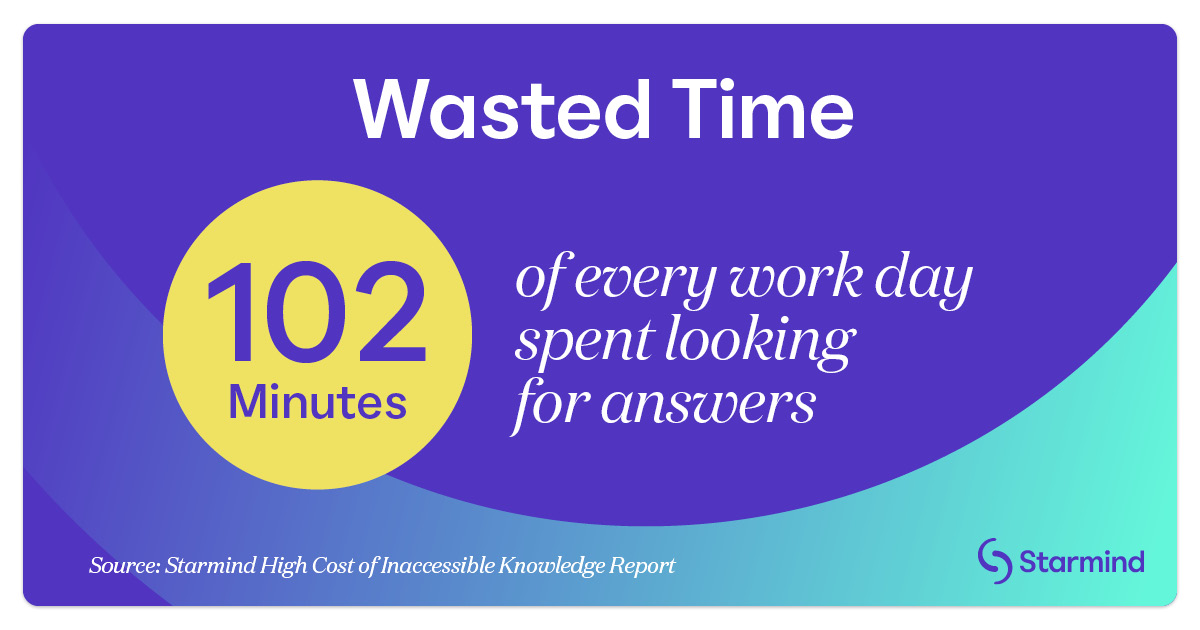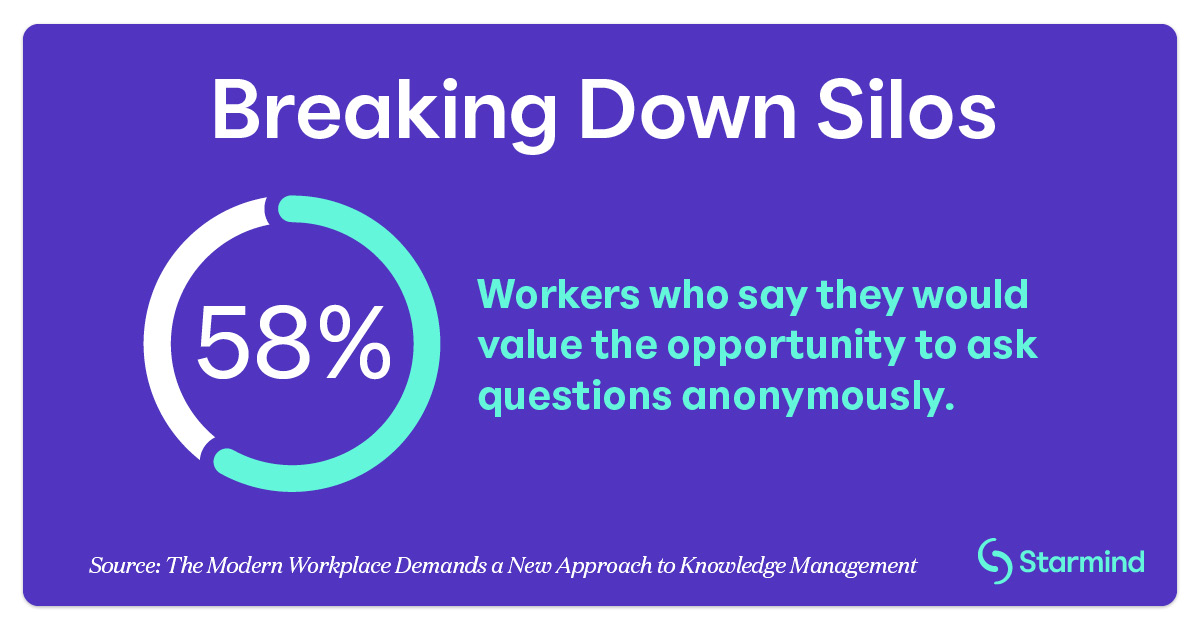Contents
Your team members bring unique expertise to their areas of concentration, but sharing that tacit knowledge with other employees hasn’t historically been very easy. And knowledge management challenges only become more complex as organizations scale.
Our Future of Work report found organizations worldwide share many common knowledge management challenges:
- Two-thirds of workers have less time for deep work because of the time they spend searching for information.
- Nearly half (48%) said they couldn’t access the knowledge they needed quickly enough to do their jobs effectively.
- Employees spend over 100 minutes looking for answers every day.
Each of these challenges can be addressed using the principles of modern knowledge management. Let’s review some of the most common ones and their solutions.

The Importance of Efficient Knowledge Management in the Enterprise
Employee knowledge can be your organization’s most valuable asset, but only if that knowledge is available to everyone when they need it.
While all knowledge workers can benefit from more robust and engaging knowledge management solutions, efficient knowledge management can be particularly beneficial for sales, R&D, and IT help desk teams. Common manifestations include:
- Research and development (R&D) teams are slow to move to market.
- Sales teams are unable to respond to requests from customers in a timely manner.
- Help desks lose the battle against a growing backlog of service requests.
Most of the knowledge within your organization isn’t documented or searchable. As a result, your employees can struggle to find relevant, accurate information when they need it. This causes additional work, delays and a bad experience for everyone involved.
Traditional knowledge-sharing systems can sometimes worsen the situation, leading to further delays, wasted time and missed opportunities.
6 Common Knowledge Management Challenges
Every enterprise has unique challenges with knowledge sharing and management. Here are some of the most common challenges seen across companies and industries.
A System That Isn’t Intuitive for Employees
People want accurate, efficient resolutions to their questions at work. Finding correct information is more important than connecting with a specific individual in most circumstances. According to a Forrester study commissioned by Starmind, two-thirds of surveyed workers said they value being able to connect and engage with colleagues no matter their job role or location.
Finding answers is important to your workers, but that’s not all — 69% of respondents said they would like a way to share their skills and contribute their own knowledge. When employees are engaged, they relish opportunities to show off their strengths while helping to provide useful information for their colleagues.
Historically, knowledge management systems required workers to stop their work and devote time to manual documentation. These systems were not intuitive, which limited their usefulness. In contrast, modern knowledge systems are designed to intuitively capture and share this information in the flow of work.
Unnecessary Exposure to Security Risks
Maintaining data security is critical in knowledge management, especially with more teams working remotely and using personal devices. Your internal knowledge may include sensitive data, such as personal identifiable information (PII), sales and customer data, or other proprietary knowledge.
Your organization must maintain a high level of information security and ensure that vendors and partners comply with any relevant privacy and security needs. This responsibility is particularly important in collaboration with R&D. Look for certifications, such as ISO 27001, for further evidence that your knowledge management system — and the knowledge within it — is secure.
If you haven’t evaluated your knowledge management system against these factors, you risk unauthorized access to sensitive information due to leaks, corruption, ransomware or other threats. In contrast, when users know they can trust that a system is secure, they’re more open to sharing detailed information.
Lack of a Defined Knowledge Management Strategy
Without a defined knowledge management strategy, knowledge sharing in your organization will likely be haphazard and
Your team’s activities won’t be tied to specific business outcomes, so people won’t be incentivized to contribute to the program. A lack of strategy also makes it difficult to maintain appropriate funding for the systems that support modern knowledge management.
A Meaningful Way to Measure People’s Contribution
If your knowledge management system relies on manual documentation across multiple systems, it becomes impossible to monitor and reward people for sharing their expertise, further disincentivizing participation across your organization.
Unreliable Resource Hubs
The knowledge in your company becomes most valuable when your team has access to it. Traditional knowledge bases or wikis are widely used in large organizations, but the information they contain can be unreliable and hard to validate.
Manually documenting and maintaining knowledge is tedious, meaning only a tiny percentage of any available information can be stored and updated at one time. These processes leave knowledge undocumented, and employees spend more time away from their work searching for information. This lack of resources has led to a poor experience for many employees, as only 8% say they are very satisfied with the tools in use at their company.
Closed Organizational Culture
Culture affects how people think about knowledge management, whether information is hoarded or if asking for help is seen as a sign of incompetence. Individuals, or even teams, may withhold knowledge for different motivations, such as competition or fear. This may not even be deliberate. As companies grow, teams naturally focus on their departmental needs first, leading to knowledge silos and less efficiency. Avoid knowledge hoarding by making it quick and easy to share knowledge and encouraging collaboration throughout all levels of the organization.
Poorly Organized Communication Channels
Your team needs access to reliable on-demand answers when they have questions, but those answers aren’t always available or easy to find. Limited resources can lead to inefficient communication. Processes can become outdated as work habits and environments change. Remote teams, for example, have different needs than a team working from a single office.
How to Overcome Knowledge Management Challenges
Addressing these knowledge management challenges can seem overwhelming, but a systematic approach can allow you to overcome them efficiently and strategically.
Design a Pilot
Knowledge management is an ongoing process, so don’t expect your first attempt at updating your strategy and systems to be your last. Start your new processes with a small subset of your team who frequently engage with other employees throughout your organization. Regularly measure and evaluate results, and share them with key stakeholders. Collect feedback throughout this process to determine what’s successful and where you need to make changes.
This can be an excellent opportunity to learn more about how your team will engage with your system, and you can begin establishing standards and benchmarks based on real-world contributions. Use this phase to confirm that any changes are still aligned with your KM strategy and that your efforts are creating value for the organization and helping to foster a knowledge-sharing environment.
Train Your Team
Employee engagement can make or break your knowledge management system. At times, what’s perceived to be a resource or system issue is actually related to a lack of training or confidence. All team members should have a basic understanding of your knowledge management system and processes. They should also have consistent guidance on using these platforms and contributing to them.
This is especially important for help desk and sales teams, which benefit from consistent processes that free them up to help customers with thornier issues. Consistent training also creates a culture of knowledge sharing and encourages open communication and collaboration.
Make Information Easy to Find
In modern knowledge management, simply documenting information isn’t enough. Employees need to be able to quickly and easily find answers. Employees can waste hundreds of hours each year searching for solutions that could have easily been provided by a colleague or found in a knowledge base.
It’s important to provide a structure for communication that allows your team to ask questions and address issues quickly and easily. Utilize a process that connects employees with a network of subject matter experts to help resolve technical problems. Teams should know exactly which communications channels to use, and you should review those channels to ensure they’re the most effective.
Implement the Right Technology
Technology, including artificial intelligence (AI), can be the missing piece in your knowledge-sharing puzzle. AI in knowledge management can create a more robust, real-time network that makes knowledge more easily accessible and provides users with more opportunities to find answers independently. The right platform can augment human intelligence, making knowledge sharing dynamic and intuitive. When this occurs, everyone in your organization has accurate and up-to-date information.
Security risks can be minimized with secure technology, allowing users to share and access information more comfortably. Training and onboarding can be streamlined with simple platforms when systems are intuitive and a part of normal routines.
Integrations with existing platforms can make sharing information an easy, seamless process, which leads to a better user experience and increased engagement. Rather than trying to retain and document all the knowledge they have gained throughout their experiences, team members can answer questions when they’re relevant, and those answers can be captured, shared and expanded upon. The right technology also enables ongoing knowledge contributions, which creates value even after the implementation phase is completed.
Facilitate Collaboration
Knowledge management and collaboration naturally complement each other. Provide new opportunities for teams to pool their knowledge and resources, whether to accelerate innovation, streamline processes or expand knowledge transfer. Collaborative projects promote a more open culture and encourage regular communication.
This is especially valuable for cross-functional R&D efforts. Create a work environment that encourages collaboration by making it a cultural value and providing sufficient technology and resources.
Clarify the Benefits for Your Team
Effective knowledge management is beneficial for all members of your organization. Explain the purpose and rationale of your strategy at the organizational level and for teams and individuals. Draw clear connections from your knowledge management strategy to overall business objectives.
Develop a method for measuring individual contributions and employee adoption, which can help you identify subject matter experts who can make powerful contributions to your organizational knowledge.
Measuring engagement can also help identify strengths and opportunities with your system and your teams. As employees become more comfortable with your KMS and recognize its value, they’ll use it more frequently and effectively.
It’s important to highlight the individual benefits of your KM strategy along with larger organizational advantages. Show help desk employees, for example, how they’ll resolve tickets faster with a robust knowledge management system while also benefiting from a smaller ticket backlog as other employees self-resolve their would-be tickets.
Break Down Silos
So much knowledge is locked in silos within organizations. This problem can go unnoticed for a long time even as it negatively impacts innovation, productivity and knowledge retention. Teams waste time searching for information without realizing their co-workers elsewhere in the business might have the answers they need. Meanwhile, subject matter experts’ knowledge isn’t necessarily documented or shared widely throughout the organization, creating further risk to the business.
Providing a quick and easy way for your teams to find the information they need helps break down these silos and encourages further collaboration and knowledge sharing. Employees who recognize the value of communicating and sharing their knowledge are more engaged and productive.
Embrace Modern Knowledge Management
As with any business process, improving your organization’s knowledge management isn’t a one-time action. You must regularly assess your practices to determine where you’re succeeding and where you have opportunities to improve.
Start by identifying the challenges that have the biggest impact on your organization; solve those first. Make sure your knowledge management strategy is aligned with your goals and enables your team to find and share knowledge effectively.
Once your goals are set and your strategy is in place, ensure you have a knowledge management system ready to connect the right people to the right information at the right time. A modern knowledge management platform can help your teams quickly find the answers they need. Customers and team members don’t have to wait for their questions to be addressed, business operations become more efficient, and your knowledge base grows as employees add their expertise.
Discover more about the high cost of inaccessible knowledge and how to modernize your knowledge management strategy.




